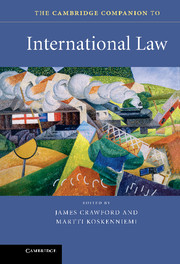Book contents
- Frontmatter
- Contents
- Preface
- Notes on contributors
- Introduction
- Part I The contexts of international law
- Part II International law and the state
- Part III Techniques and arenas
- Part IV Projects of international law
- 12 Constituting order
- 13 Legitimating the international rule of law
- 14 Human rights in disastrous times
- 15 Justifying justice
- 16 Regulating trade, investment and money
- 17 Divided against itself
- 18 Conserving the world’s resources?
- Guide to electronic sources of international law
- International law chronology
- Select guide to further reading
- Index
- References
15 - Justifying justice
from Part IV - Projects of international law
Published online by Cambridge University Press: 05 July 2015
- Frontmatter
- Contents
- Preface
- Notes on contributors
- Introduction
- Part I The contexts of international law
- Part II International law and the state
- Part III Techniques and arenas
- Part IV Projects of international law
- 12 Constituting order
- 13 Legitimating the international rule of law
- 14 Human rights in disastrous times
- 15 Justifying justice
- 16 Regulating trade, investment and money
- 17 Divided against itself
- 18 Conserving the world’s resources?
- Guide to electronic sources of international law
- International law chronology
- Select guide to further reading
- Index
- References
Summary
Until lions have their own historians, tales of the hunt shall always glorify the hunter. (Ibo proverb)
Sudan, December 2008
In a camp for displaced persons in Darfur, children have tied a cord around a hedgehog’s neck. ‘This is President Bashir and we are taking him to the International Criminal Court.’ Awaiting the BBC and CNN, spokespersons for the displaced chant: ‘We need NATO, the EU and the ICC.’ Tribal leaders, asked why they no longer use traditional justice mechanisms, explain: ‘This is genocide and only the International Criminal Court can address genocide.’ New-born boys have been named ‘Ocambo’, after the Court’s Prosecutor. Bolstered by ‘brother’ Ocampo’s request for an arrest warrant for the Sudanese President on charges of genocide, crimes against humanity and war crimes, one of the rebel movements has launched an attack on the Sudanese capital and another has refused to participate in peace talks, arguing that one should not negotiate with ‘war criminals’. The Sudanese government, in turn, publicly denounces the International Criminal Court (ICC). Driving from the airport into Khartoum one is greeted by enormous billboards showing a strong President and reading: ‘Ocampo’s Plot: A Malicious Move in the Siege’, ‘Protect the International Law from Ocampo’s Illusions’ and ‘No for the Oppression of Peoples under the Name of International Law!’
- Type
- Chapter
- Information
- The Cambridge Companion to International Law , pp. 327 - 351Publisher: Cambridge University PressPrint publication year: 2012
References
- 9
- Cited by



